Rugby World Cup 2019: Who stands in Wales' path to the final?
- Published
- comments
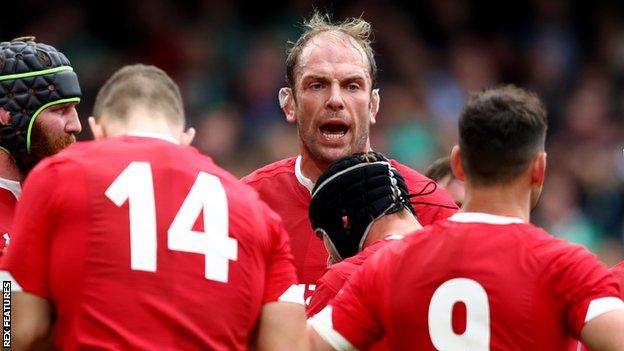
Lock Alun Wyn Jones captains Wales and is playing in his fourth World Cup
World Cup - Pool D: Wales v Georgia |
|---|
Venue: City of Toyota Stadium, Toyota City Date: Monday, 23 September Kick-off: 11:15 BST |
Coverage: Full commentary on every Wales game across BBC Radio Wales and Radio Cymru, BBC Radio 5 Live and Radio 5 Live Sports Extra, plus text updates on the BBC Sport website and app. |
Wales begin their ninth World Cup campaign ranked amongst the favourites, despite a string of set-backs that in previous tournaments would have had them written off as contenders.
Warren Gatland's side are without first-choice number eight Taulupe Faletau and fly-half Gareth Anscombe through injury, and had backs coach Rob Howley sent home from Japan for an alleged betting infringement - just six days before their opening game against Georgia.
But the strength in depth of Welsh rugby means that those two key playing positions are filled by British and Irish Lions - Ross Moriarty and Dan Biggar - while backs-coach-in-waiting Stephen Jones - who was set to take over from Howley after the tournament - has flown out to begin his tenure a couple of months early.
So having not so much rolled with the punches as absorbed them, Wales begin their campaign full of confidence and with real belief that this could be their year.
BBC Sport Wales looks at the teams and their star players who stand between Wales and the Webb Ellis Cup.
Georgia (23 Sep, 11:15 BST; Toyota City)
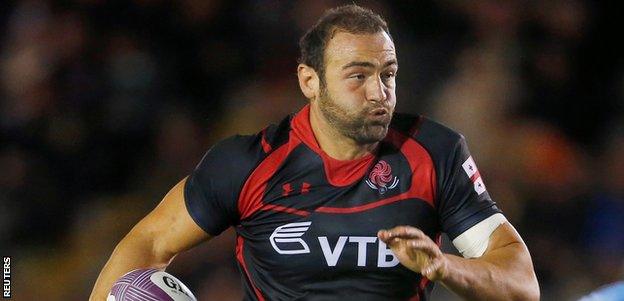
Toulon forward Mamuka Gorgodze remains a big presence for Georgia in his fourth World Cup
Wales have met Georgia just once before, during the 2017 Autumn internationals where a second-string laboured to a 13-6 win over their visitors in Cardiff.
Despite two disappointing warm-up defeats to Scotland, Georgia are comfortably Europe's strongest tier-two nation and eager to push their case to join the Six Nations with Italy stagnant.
Under the coaching of New Zealander Milton Haig, Georgia have won five Rugby Europe Championship Grand Slams in six years and qualified automatically for Japan thanks to a third-place pool finish at the 2015 World Cup.
The Lelos pack is huge, coached by ex-England prop Graham Rowntree and helped by the return from retirement of Toulon's lock or back-row Mamuka Gorgodze for a fourth World Cup, while the backline is young, adventurous and full of potential.
Georgia are a team that Wales cannot take likely, but should still beat comfortably in a useful workout to set themselves up for the rest of the pool.
Australia (29 Sep, 08:45 BST; Tokyo)
Wales next go into what should be the Pool D top-spot decider, bolstered by last season's November win over Australia - a 9-6 result that ended a run of 13 straight defeats stretching back to 2008.
Games between the two nations in recent history have generally been tight, albeit with the Wallabies usually coming out on top, and their clash in Tokyo promises more of the same.
Michael Cheika's side handed New Zealand a 47-26 defeat in Perth - the heaviest in the All Blacks' 583-Test history - in the Rugby Championship in August, helped by the dismissal of Kiwi lock Scott Barrett just before half-time.
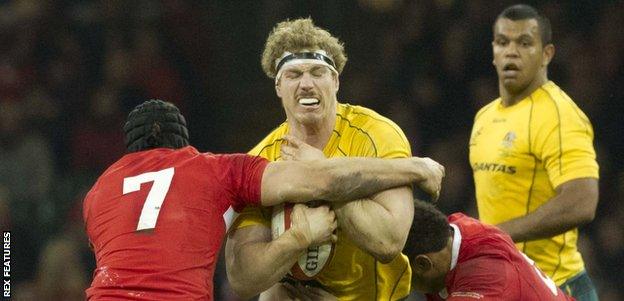
Australia back-row David Pocock has often proved to be Wales' undoing
But the return encounter in Auckland saw New Zealand gain revenge by thrashing their tormentors 36-0.
The two results underline what Wales will face: a side that ruthlessly exploits any weakness in the opposition, but that is also vulnerable to the wheels coming off when under pressure.
It's an Australia side without full-back Israel Folau, sacked after his anti-gay comments on social media, but still with bags of backline talent.
Kurtley Beale is the likely candidate to fill the 15 shirt, still a dangerous attacker but less secure in defence. A bit of drizzle and a couple of high balls wouldn't hurt Wales' chances at all.
Back-rows David Pocock - recently returned from a calf injury - and Michael Hooper, plus options in Isi Naisarani, Lukhan Salakaia-Loto and Jack Dempsey, will be their usual ball-snaffling selves and the battle with Justin Tipuric and his Wales breakaway colleagues could decide the outcome.
Fiji (9 October, 10:45 BST; Oita)
On paper Wales' record against Fiji points overwhelmingly to a win for Gatland's side: played 11, won 9, drawn one, lost one.
But that solitary loss, external in Nantes in the 2007 World Cup still haunts the Welsh psyche. A late try from Graham Dewes saw Wales exit the competition at the group stage, booked Fiji's place in the quarter-finals, and signalled the end of Gareth Jenkins' tenure as Wales coach.
Fiji coaches always have the headache of assembling a coherent squad from a far-flung pool of players, but John McKee's side have been in impressive form.
In recording the first win in their history over France last season, the current Fiji side served notice that they're not at Japan 2019 just to make up the numbers.
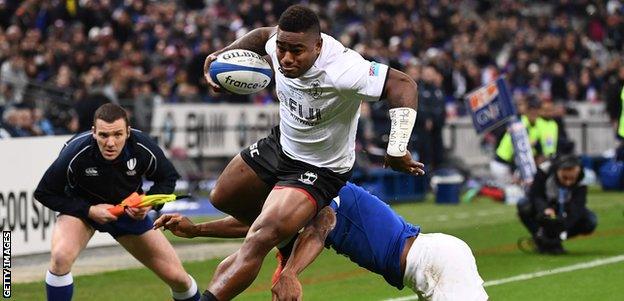
Back Josua Tuisova was one of Fiji's star turns as they beat France for the first time last season
Winger Vereniki Goneva - who has joined Harlequins from Newcastle Falcons and was previously a hit at Leicester - became Fiji's record try scorer last month when he claimed his 21st score in 56 Tests in the Pacific Nations Cup win over Samoa.
But fellow three-quarter Josua Tuisova, 25, is already on his way to beating that mark as Lyon's new recruit already has four tries from nine Tests.
Racing 92 lock Leone Nakarawa, who was previously at Glasgow Warriors, is another star turn. His offloads from broken play are eye-catching and very Fijian, but he does the hard grunt work in the pack as well.
The backbone of the squad is drawn from the French Top 14 and English Premiership, with a smattering from the Guinness Pro14 and those based in the southern hemisphere.
If forewarned is forearmed, then Wales know that the Flying Fijians must be treated with utmost respect if a repeat of '07 is to be avoided.
Uruguay (13 October, 09:15 BST; Kumamoto City)
If all has gone to plan, Wales' final pool game should be a chance for Gatland to rest some of his front-line players ahead of the quarter-finals.
Wales beat Uruguay 54-9 four years ago in the pool stage, although at this World Cup at least the majority of Los Teros are now full-time professionals.
The control in Esteban Meneses' side comes in the shape of scrum-half Agustin Ormaechea and fly-half Felipe Berchesi, who both play in the French Pro D2 for Stade Montois and US Dax respectively.
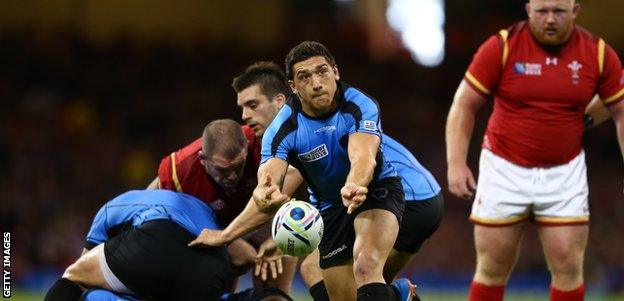
Scrum-half Agustin Ormaechea has rugby pedigree but his Uruguay side are the Pool D minnows
Ormaechea's father Diego is considered Uruguay's greatest player, scoring 16 tries in 73 Tests over a 20-year career before he retired after the 1999 World Cup aged 40.
That tournament saw Uruguay record their first World Cup victory, a 27-15 win over Spain in Galashiels, with their only other success in the tournament a 24-12 result over Georgia in 2003 in Sydney.
A similar result over a massively improved Georgia this time seems unlikely, but should lightning strike twice Los Teros' campaign will be seen as a huge success.
The quarter-finals (19 or 20 October, 08:15 BST; Oita Prefecture)
The top two sides from Pool D will match up against their counterparts from Group C, which contains England, France, Argentina, USA and Tonga.
The smart money is on England and France advancing to face Wales and Australia, with each pool winner facing the runner-up from the opposing pool.
But Argentina will also fancy their chances of making the C/D quarter-finals, which will both be played at Oita Stadium.
The encouraging thing for whichever teams remain in this side of the draw is avoiding either New Zealand or South Africa - who have won five of the previous eight tournaments between them - until at least the semi-finals.
Whether it's England, France or Argentina awaiting them, Wales will believe they have the necessary firepower to reach the semi-finals.
The semi-finals (26 or 27 October, 09:00 BST or 09:00 GMT; Yokohama City)
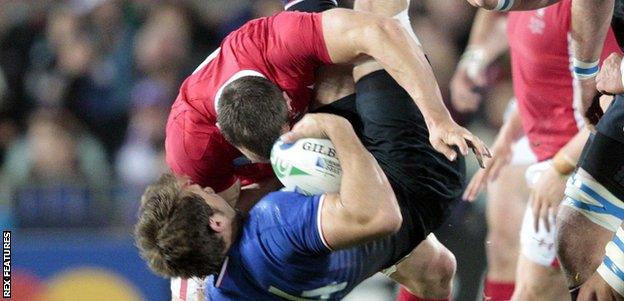
Sam Warburton's semi-final sending off against France in 2011 was a tipping point for Wales
Wales have reached this stage twice before, beaten heavily by New Zealand in the inaugural World Cup in 1987 and losing agonisingly to France by a single point in 2011 - having had skipper Sam Warburton sent off in the first half for a tip tackle.
Potential opponents must include the All Blacks, who have only once failed to reach the semi-finals, and Australia and France who have both been here six times before.
South Africa have reached the semis in four of the six World Cups they have been involved in, while England have also reached the last four on four previous occasions.
Argentina have featured twice, the same as Wales, and Scotland once. Could hosts Japan - having shown their potential by humbling South Africa in the pool stage four years ago - upset the odds and make an appearance at this stage?
Then there is the emerald elephant in the room in the shape of Ireland, whose lack of a semi-final appearance is surprising given their resurgence over the past decade. Joe Schmidt's side come into the tournament ranked first in the world and having beaten every tier one rival in this World Cup cycle.
The final (2 November, 09:00 GMT; Yokohama City)
Could this be Gatland's last competitive fixture in charge of Wales, a week shy of a dozen years since the WRU announced his appointment, as he ends his tenure after the tournament?
It would be fitting. It would be a chance for Wales to back up the number one world ranking they held in the summer. It would be the stuff of dreams.
It is within Wales' grasp.
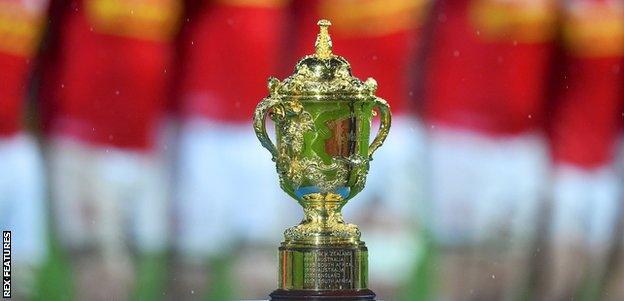
Will a new name be engraved on the Webb Ellis Cup in 2019?